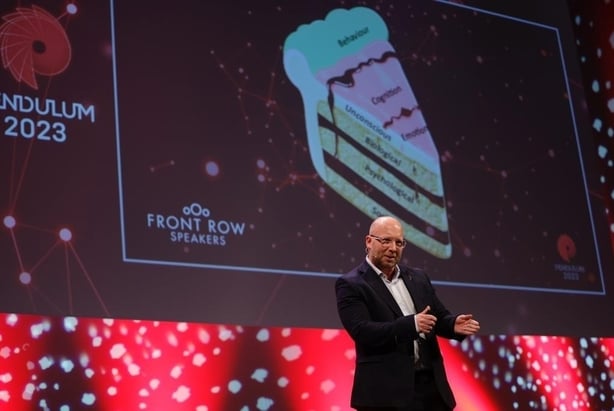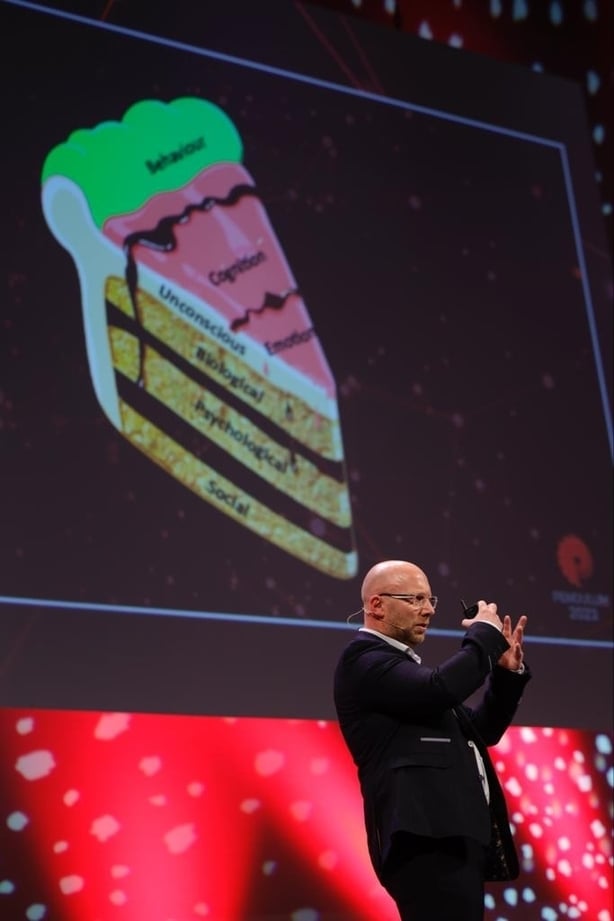In operation since 2014, Pendulum Summit is a world-class business and self-empowerment summit that invites some of the best and brightest minds of business, leadership, and culture to share their greatest learnings and insights under one roof.
Taking place at Dublin's Convention Centre, this year's event boasts a number of high-profile keynote speakers including Olympic champion Michael Johnson, performance guru Dr. Joe Vitale, race car driver Susie Wolff, and Dr. Colman Noctor, a Child and Adolescent Psychoanalytical Psychotherapist.

Speaking on the need for respite and downtime, Noctor's presentation aimed to offer some relief from the rhetoric that we should all be working at full capacity at all times.
"A huge percentage of us are average. By definition, most of us are that," he explained. "If we make [being] average bad, or see it as a disappointment rather than a relief, then we consign a lot of the population to being unhappy."
"I work with a lot of people in the high level of eliteness," he continued, "not to improve their performance but because the eliteness broke them. There's a sustainability issue; not a green one, but a mental health one. Maybe a little bit of balance and moderation is key to that."
Reflecting on the various streams of social media that many of us carry around in our pockets, Noctor told RTÉ Lifestyle that watching everyone's highlight reels can lead users to make unhelpful comparisons to their own lives.
"Myself and my son watch Match of the Day, and he loves it, but I took him to a full match and he was really bored because he had to sit through all of the other bits.
"It's interesting because a lot of us think that's the real world when, in actual fact, there's a lot of labour and hard work and struggle that goes into that too. Maybe because we don't share that, we don't see it. It's really about un-filtering and un-photoshopping the image you have in your mind of everyone else doing better."
According to the psychotherapist, by looking at everyone's curated online life and comparing them to our real lives, we are "inviting unhappiness" because enough will no longer be enough.
"If you're making your own value systems, that's something you create for yourself. It shouldn't really be influenced by other people," he added.

If you are beginning to question your lifestyle habits, there are a number of factors that you can take into consideration to figure out when and where you may need to step back.
From biology and physical health to cognitive function and social connections, there are plenty of red flags that can pop up in our actions and behaviours that can indicate a need for change.
"It's not always about sticking it out and persevering, sometimes it's about having the courage to say 'I need something different' or 'I need some space' or 'I need some respite'. I think, as I said, the most resilient people I've ever met have sat in front of me in a therapy room. They're teaching you how the world of adversity works and how they've fought to manage it.
"Resilience is about being good at the bad times, it's not about being good at the good times."
Speaking against the popular idea that 'children are incredibly resilient', Noctor insisted that resilience is not born out of adversity.
"It's not that kids are resilient, it's that some kids are resilient, and there are oftentimes ones who aren't. The idea that more adversity makes you more resilient is nonsense. If I injured my calf, you wouldn't tell me to go out and run 10k on it, you'd rest it, you'd give it ice, you'd recover."
"There is a myth that the tougher your life is the more resilient you are," he continued. "Adversity doesn't breed resilience, resilience determines how you respond to adversity."
Watch our interview with Dr Colma Noctor at Pendulum Summit 2023 above.
